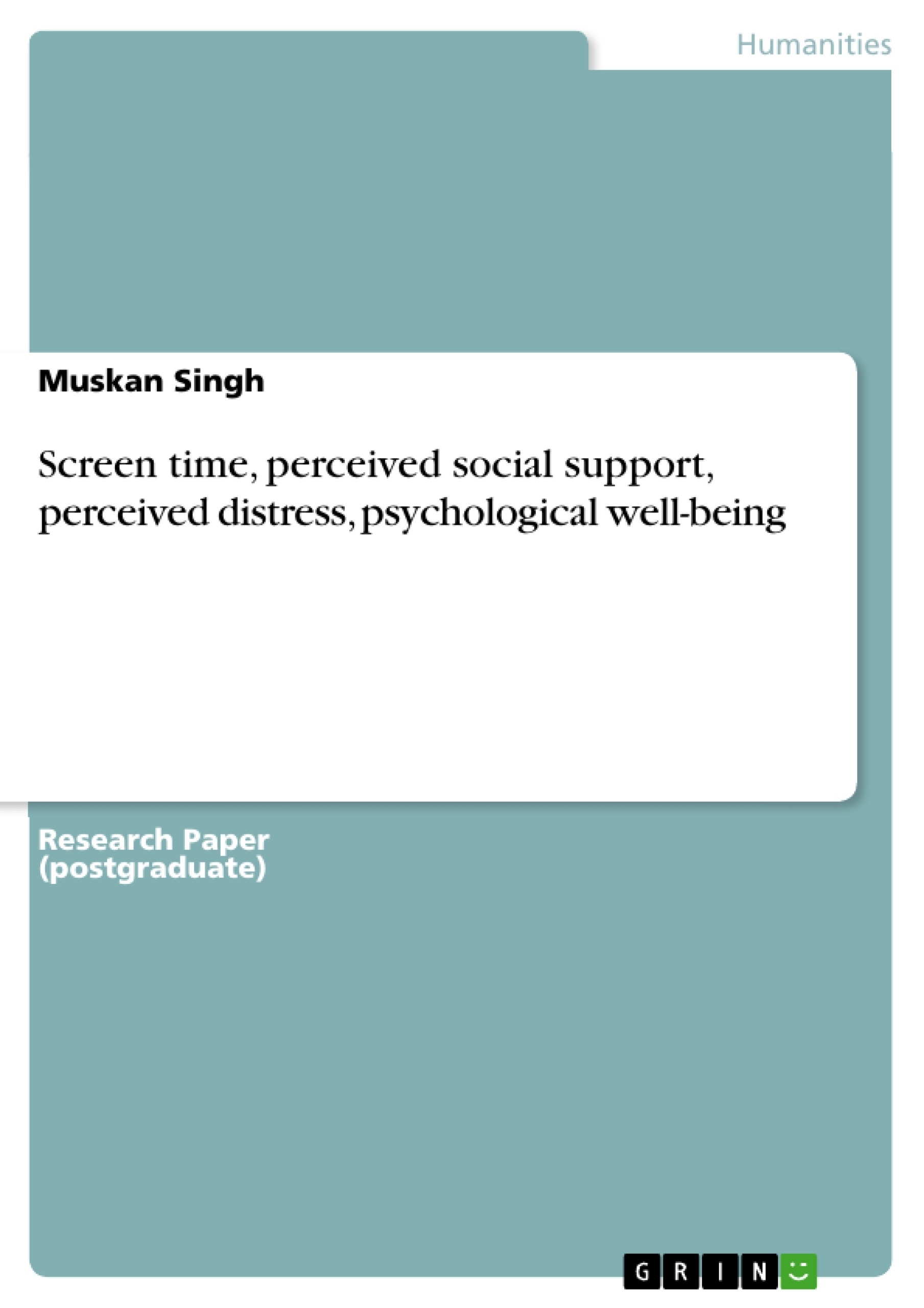Excessive screen time could affect our well-being and happiness. However, it was not very clear whether excessive screen time is related to social support, perceived distress, and psychological well-being or not. Therefore, this study will focus on finding the impact of screen time on a young adult’s social support, distress, and well-being. Consumption of online platforms can be an isolating experience and, consequently, can have a direct bearing on the person’s sense of social support, distress, and well-being.
The aim of this study is to examine the pattern of screen-time use and psychological distress among Indian youth. This study is a cross-sectional study done on 201 participants, both male and female, who were included in this study. A total of four scales were used to empirically represent the data and using the following scales Screen time 18 Items Questionnaire, Multidimensional Scale for Perceived Social Support (MSPSS), Perceived Stress Scale and Psychological Well-Being Scale.
Inhaltsverzeichnis (Table of Contents)
- INTRODUCTION
- LITERATURE REVIEW
- METHODOLOGIES
- RESULTS
- DISCUSSION / CONCLUSION
- REFERENCES
- ANNEXURES
Zielsetzung und Themenschwerpunkte (Objectives and Key Themes)
This dissertation explores the relationship between screen time usage and psychological well-being among Indian youth. The study aims to understand the patterns of screen time use, assess its impact on social support, perceived distress, and overall well-being, and potentially identify areas for intervention in addressing internet addiction.
- Screen time usage patterns among Indian youth
- Correlation between screen time and perceived social support
- Impact of screen time on perceived distress
- Influence of screen time on psychological well-being
- Potential implications for interventions related to internet addiction
Zusammenfassung der Kapitel (Chapter Summaries)
- Chapter 1: Introduction This chapter provides a background on the increasing concern surrounding excessive screen time usage and its potential effects on mental health, particularly among young people. It highlights the need for research to understand the complex relationship between screen time and psychological well-being, specifically focusing on the Indian context.
- Chapter 2: Literature Review This chapter reviews existing research on the relationship between screen time, social support, perceived distress, and psychological well-being. It examines previous studies that explored the impact of excessive screen time on various aspects of mental health, including social interaction, stress levels, and overall well-being.
- Chapter 3: Methodologies This chapter details the research methodology employed in the study, including the participants, the data collection methods, and the specific scales used to measure screen time usage, social support, perceived distress, and psychological well-being.
- Chapter 4: Results This chapter presents the findings of the study, analyzing the data collected from the participants and exploring the relationships between screen time usage and other measured variables.
Schlüsselwörter (Keywords)
This research focuses on the relationship between screen time, social support, perceived distress, and psychological well-being in Indian youth. It utilizes various research methods to examine the potential impact of excessive screen time on mental health and explores the implications for interventions aimed at mitigating internet addiction.
Frequently Asked Questions
How does excessive screen time affect psychological well-being?
Excessive screen time is linked to decreased happiness and overall well-being. It can be an isolating experience that negatively impacts a person's mental health.
Is there a correlation between screen time and social support?
Yes, the study examines how online platform consumption can influence a person’s sense of perceived social support, often leading to feelings of isolation.
What is the impact of screen time on perceived distress?
High levels of screen time are often associated with increased psychological distress and stress among young adults.
Which scales were used in this study on Indian youth?
The research utilized the Screen Time 18 Items Questionnaire, the Multidimensional Scale for Perceived Social Support (MSPSS), the Perceived Stress Scale, and the Psychological Well-Being Scale.
What are the implications for internet addiction interventions?
By understanding screen time patterns, the study aims to identify areas for intervention to mitigate internet addiction and improve mental health outcomes for youth.
- Quote paper
- Muskan Singh (Author), 2022, Screen time, perceived social support, perceived distress, psychological well-being, Munich, GRIN Verlag, https://www.hausarbeiten.de/document/1298503


